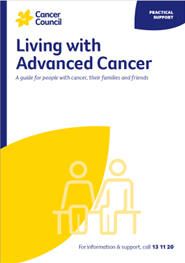- Home
- About Cancer
- Advanced cancer
- Living with advanced cancer
- Treatment for advanced cancer
- Making treatment decisions
Making treatment decisions
Get insights on treatment options for advanced cancer and how to make informed decisions about your health and comfort.
Learn more about:
- Overview
- Knowing your options
- Recording the details
- Asking questions
- Considering a second opinion
- Talking about treatment decisions
- Should I join a clinical trial
Overview
It can be difficult to decide what treatment to have for advanced cancer. Some people choose treatment even if it offers only a small benefit for a short period of time. Others decide not to have active treatment for the cancer, but to treat symptoms to reduce discomfort and maintain quality of life. What you decide may change over time.
You may want to think about what quality of life means to you and the impact of treatment. Perhaps you would choose chemotherapy if it meant you could have two good weeks each month. Or it might be more important to you to spend as much time as possible with family and friends, without the disruption of tests, treatment or hospital visits.
Know your options
Understanding the disease, the available treatments and possible side effects can help you weigh up the options and make a well-informed decision. It can also help you feel more in control to have all the information you can about the diagnosis.
Record the details
When your doctor first says you have advanced cancer, you may not remember everything you are told. Taking notes can help. If you would like to record the discussion, ask your doctor first. It’s a good idea to have a family member or friend come to appointments to join in the discussion, write notes or simply listen.
Ask questions
If you are confused or want to check anything, it is important to ask your specialist questions. Try to prepare a list before appointments. If you have a lot of questions, you could talk to a cancer care coordinator or nurse.
Consider a second opinion
You may want to get a second opinion from another specialist to confirm or clarify your specialist’s recommendations or reassure you that you have explored all of your options. Specialists are used to people doing this.
Your GP or specialist can refer you to another specialist and send your initial results to that person.
You can get a second opinion even if you have started treatment or still want to be treated by your first doctor. You might decide to be treated by the second specialist.
Talking about treatment decisions
Discussing the kind of care you might want in the future can be difficult. However, talking to your family about this can help them if you become too sick to make decisions, and they need to make decisions about your health care for you.
Palliative Care Australia has a discussion starter that can help you reflect on your preferences for care and talk about them with your family. See Dying to Talk Discussion Starter.
Should I join a clinical trial?
Your doctor or nurse may suggest you take part in a clinical trial. Doctors run clinical trials to test new or modified treatments and ways of diagnosing disease to see if they are better than current methods.
For example, if you join a randomised trial for a new treatment, you will be chosen at random to receive either the best existing treatment or the modified new treatment.
Over the years, trials have improved treatments and led to better outcomes for people diagnosed with cancer.
You may find it helpful to talk to your specialist, a clinical trials nurse or GP, or to get a second opinion.
If you decide to take part in a clinical trial, you can withdraw at any time. For more information, visit, Australian Cancer Trials or see Clinical trials and research.
→ READ MORE: When treatment seems too much
Podcast: Treatment Options for Advanced Cancer
Listen to more of our podcast for people affected by advanced cancer
More resources
Dr Lucy Gately, Medical Oncologist, Alfred Health and Walter and Eliza Institute for Medical Research, VIC; Dr Katherine Allsopp, Supportive and Palliative Care Specialist, Westmead Hospital, NSW; A/Prof Megan Best, The University of Notre Dame Australia and The University of Sydney, NSW; Dr Keiron Bradley, Palliative Care Consultant, Medical Director Palliative Care Program, Bethesda Health Care, WA; Craig Brewer, Consumer; Emeritus Professor Phyllis Butow, Psychologist, The University of Sydney and Chris O’Brien Lifehouse, NSW; Louise Durham, Palliative Care Nurse Practitioner Outpatients, Princess Alexandra Hospital, Metro South Palliative Care, QLD; Dr Roya Merie, Radiation Oncologist, ICON Cancer Centre, Concord, NSW; Penny Neller, Project Coordinator, National Palliative Care Projects, Australian Centre for Health Law Research, Queensland University of Technology, QLD; Caitriona Nienaber, 13 11 20 Consultant, Cancer Council WA; Xanthe Sansome, Program Director, Advance Care Planning Australia, VIC; Sparke Helmore Lawyers; Peter Spolc, Consumer.
View the Cancer Council NSW editorial policy.
View all publications or call 13 11 20 for free printed copies.

